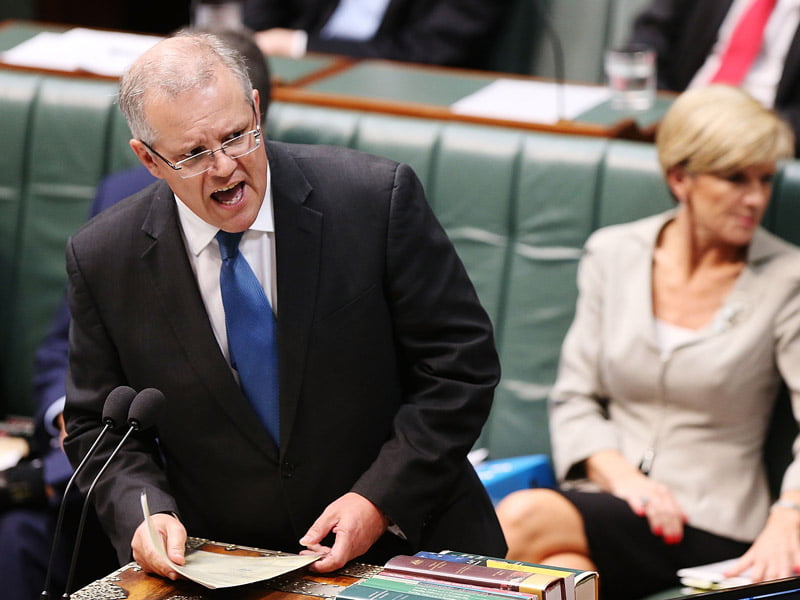Treasurer Scott Morrison will today unveil a new legislative package that will extend crowdsourced equity funding to private companies, effectively removing what had been the single biggest barrier to startups raising capital through crowdsourcing platforms.
In a big day for startups at Parliament House today, Mr Morrison will also introduce legislation that removes the double taxation of crypto-currency.
The bill, which will apply retroactively from the start of the financial year, means Australians are no longer charged GST on purchases of digital currency, allowing it to be treated the same way as physical money for GST purposes.

But it is the changes to the crowdsourced equity funding regime that will be most welcomed. Under the scheme passed by Parliament earlier this year, companies seeking to raise capital through crowdsourcing platforms had been required to convert their proprietary structure into an unlisted public company.
The government had flagged the changed in its May Budget statement, but the industry had been left wondering about the timetable for change.
As part of this Bill, proprietary companies wanting to access equity crowdfunding will no longer have to convert to a public company entity, Mr Morrison is expected to announce.
Instead founders would be able to crowdfund while retaining the greater flexibility of the proprietary model, he will say.
While the extensions would also increase the ability of retail investors to access early-stage investment opportunities, the startup companies using such schemes must comply with additional obligations to protect investors, including:
- a minimum of two directors
- financial reporting in accordance with accounting standards
- audited financial statements once the company raises more than $3 million from crowdfunding offers
- restrictions on related party transactions
The extension to proprietary companies builds on the legislative framework for public companies that was to have commenced on 29 September 2017.
Most features of the public company framework – such as the obligations of intermediaries, investor and company caps and the process for making crowdfunding offers – will be the same for proprietary companies.
Mr Morrison says the legislative changes to tax arrangements related to digital currencies delivers on its budget promise and would help to further cement Australia’s reputation as a centre for FinTech innovation.
The Bill will ensure that Australians are no longer charged GST on purchases of digital currency, meaning it will be treated the same way as physical money for GST purposes.
Currently, consumers who use digital currency can effectively bear GST twice: once on the purchase of the digital currency and once again on its use in exchange for other goods and services subject to the GST.
The thinking is that the changes will make it easier for new innovative digital currency businesses to operate in Australia.
The changes have been cautiously welcomed by the sector.
The head of Tyro Fintech Hub Andrew Corbett-Jones said that the initial version of CSEF, with its restriction to public companies, meant it was “next to useless for startups.”
“Finally we have a CSEF regime that at least matches other jurisdictions,” Mr Corbett-Jones said, applauding the government while lamenting the time it took to get to this point.
“Having said that, my advice to entrepreneurs would be to seek traditional venture finance before considering CSEF,” he said.
“Investors would do well to consider the VentureCrowd model of CSEF with a lead investor in place, or the Equitise syndicate model – they provide further layers of due diligence which can benefit investors.”
Labor’s shadow minister for the digital economy had been fiercely critical of the original crowdsourced equity funding legislation, saying at the time the legislation had been rushed through without properly addressing its shortcomings.
“They’re just shoving it through so they can get the announcement effect. They’re not doing it for the sake of a good system, they’re doing it for the sake of a good headline,” Mr Husic told InnovationAus.com last May.
Tyro’s Mr Corbett-Jones said the changes to tax arrangements for digital currencies would be welcomed by FinTech innovators.
“The double GST taxation of digital currencies made as much sense as having one toll to get onto the Harbour Bridge and another toll to get off at the other end. It is that bizarre.”
The disruption potential of digital currencies is highlighted by the fact that many countries have struggled to recognise them as being the equivalent of real money, Mr Corbett-Jones said.
“But that is what they are, even if governments are unable to regulate them. And it made no sense to charge GST when converting dollars to Bitcoin,” he said.
“This short-lived digital currency tax always seemed as archaic as the tax we all used to pay whenever we withdrew our money from a bank.”
Do you know more? Contact James Riley via Email.

